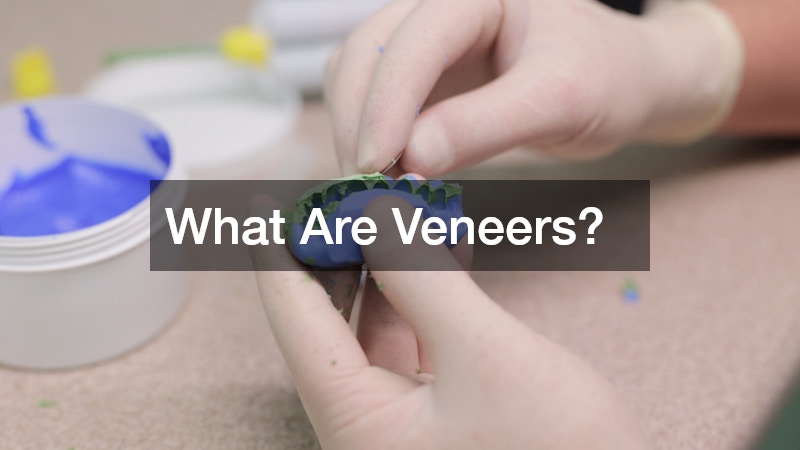Veneers are a popular cosmetic dental option that can enhance the appearance of your teeth. Many people are curious about veneers, as they consider improving their smile. This article seeks to answer some of the most common questions about veneers to help individuals make informed decisions.
What Are Dental Veneers and How Do They Work?
Definition and Purpose
Dental veneers are thin shells custom-made from either porcelain or composite resin to cover the front surface of teeth. They’re used to improve the appearance of tooth color, shape, size, or length. These veneers are expertly crafted to match the natural look of teeth, offering an aesthetic boost that is both subtle and remarkable. By addressing various dental imperfections, veneers help in restoring a person’s confidence, allowing them to smile more freely.
The veneers serve not only a cosmetic purpose but also offer some level of protection to damaged teeth. In instances where a tooth’s enamel is worn out, veneers act as a protective layer, minimizing sensitivity and further deterioration. Although primarily a cosmetic solution, dental veneers also contribute to preserving the natural tooth’s functionality by providing a stable surface.
Enfin, choosing between porcelain and composite resin veneers largely depends on the specific needs and preferences of the individual. Porcelain veneers are known for their durability and resistance to stains, making them a favored option despite being more pricey. On the other hand, composite veneers are less costly and can be applied in a single appointment, but they may not last as long as their porcelain counterparts.
The Procedure
The process of getting veneers typically involves several key steps. Initially, during the preparation phase, a small portion of the tooth enamel is removed to accommodate the veneer. This step is crucial to ensure that the veneer aligns seamlessly with the natural teeth, avoiding any noticeable protrusions. Patients often undergo a local anesthetic during this process, although discomfort is usually minimal.
After enamel removal, the dentist takes impressions of the teeth, which are essential for creating a precise mold. This mold is sent to a dental lab where the custom veneers are produced, a process that could take a few weeks. During this time, patients may receive temporary veneers to protect their prepared teeth, although it is important to handle these with care as they are not as robust as the final product.
Once the custom veneers are ready, the final phase involves bonding them to the existing teeth. Dentists use a specialized dental cement for this purpose, ensuring a strong, durable attachment. It is during this bonding stage that adjustments can be made to perfect the fit and alignment. Proper care and maintenance post-procedure ensure that veneers last many years, necessitating regular dental check-ups and good oral hygiene.
Who is a Good Candidate for Veneers?
Assessing Suitability
Veneers are ideal for individuals seeking a long-term solution to common dental concerns such as stains, chips, and irregularly shaped teeth. The transformative impact of veneers on the smile can significantly enhance one’s self-esteem, making them an appealing choice for a wide demographic. However, they are best suited for individuals with generally good oral health, as underlying issues may necessitate other treatments first.
Conversely, certain factors can disqualify a person from being a suitable candidate for veneers. Those engaging in habitual teeth grinding, known as bruxism, are typically advised against veneers unless they commit to wearing a protective nightguard. Additionally, individuals with significant tooth decay or weakened teeth might not benefit from veneers until these issues are addressed.
Candidacy for veneers requires a comprehensive evaluation by a dental professional. Such assessments often include a detailed dental history and an examination of current oral health. This evaluation helps the dentist determine the suitability of veneers or suggest alternative solutions, ensuring that patients receive the most appropriate treatment for their needs and circumstances.
Consultation and Evaluation
During a veneer consultation, patients have the opportunity to discuss their dental goals and expectations with their dentist. This preliminary discussion is vital in understanding what aspects of their smile they wish to enhance and ensures that the selected treatment aligns with their aesthetic desires. Furthermore, it provides a platform for patients to voice any concerns or questions regarding the procedure.
The evaluation typically includes a thorough examination of oral health, possibly supplemented by x-rays to assess the condition of underlying structures. Dentists also evaluate factors like gum health, as healthy gums are pivotal to ensuring the success of veneer placement. These assessments are integral to devising a treatment plan that addresses all the patient’s dental needs while optimizing veneer performance.
Finally, the consultation serves as an opportunity for the dentist to explain the procedure in detail, including any potential risks or side effects. Transparency about the permanence of veneers, associated costs, and maintenance requirements helps manage patient expectations, aligning them with achievable outcomes. Armed with this comprehensive understanding, patients can make informed decisions about proceeding with veneers.
What are the Advantages and Disadvantages of Veneers?
Benefits
The advantages of veneers are numerous, making them an attractive option for those seeking to improve their smile. One of the most notable benefits is their ability to provide a natural tooth appearance. Veneers are custom-made to blend seamlessly with existing teeth, mimicking natural enamel in translucency and color, which enhances overall dental aesthetics.
In addition to their aesthetic appeal, veneers offer practical benefits such as stain resistance. Porcelain veneers, in particular, are renowned for their ability to withstand common staining agents from foods and drinks, maintaining their bright appearance over time. This means patients can enjoy a radiant smile with less maintenance compared to natural teeth, which frequently require whitening treatments.
Veneers also boast impressive durability; with proper care, they can last a decade or longer. This longevity, coupled with the transformative effects on appearance, makes veneers a worthwhile investment for many. Regular dental check-ups and diligent oral hygiene practices are crucial in maximizing the lifespan of veneers, ensuring they remain an effective cosmetic solution.
Considerations and Drawbacks
Despite their many benefits, there are several considerations and drawbacks associated with veneers that prospective patients should weigh. Foremost among these is the irreversibility of the procedure. Since the process involves removing a portion of the enamel, once a tooth has been prepped for veneers, it cannot be left exposed or returned to its original state without continuing veneer coverage.
Another potential downside is increased tooth sensitivity. After the enamel is reduced, some patients experience heightened sensitivity to temperature changes or certain foods. While this sensitivity typically diminishes over time, it can be an uncomfortable side effect that may influence a patient’s decision to proceed with veneers.
Costs are also a critical factor to consider, as veneers generally involve a higher initial expense compared to other cosmetic dentistry options. However, their long lifespan and minimal maintenance requirements often justify the cost for many patients, especially when combined with the significant aesthetic enhancements they provide. Ultimately, careful consideration and consultation with a dental professional are essential in determining if veneers align with a patient’s goals and budget.
Veneers can be a great solution for transforming your smile, yet they require careful consideration and consultation with a dental professional. By understanding what veneers are, assessing candidacy, and weighing the pros and cons, individuals can make a well-informed choice about whether veneers are suitable for their dental needs.



